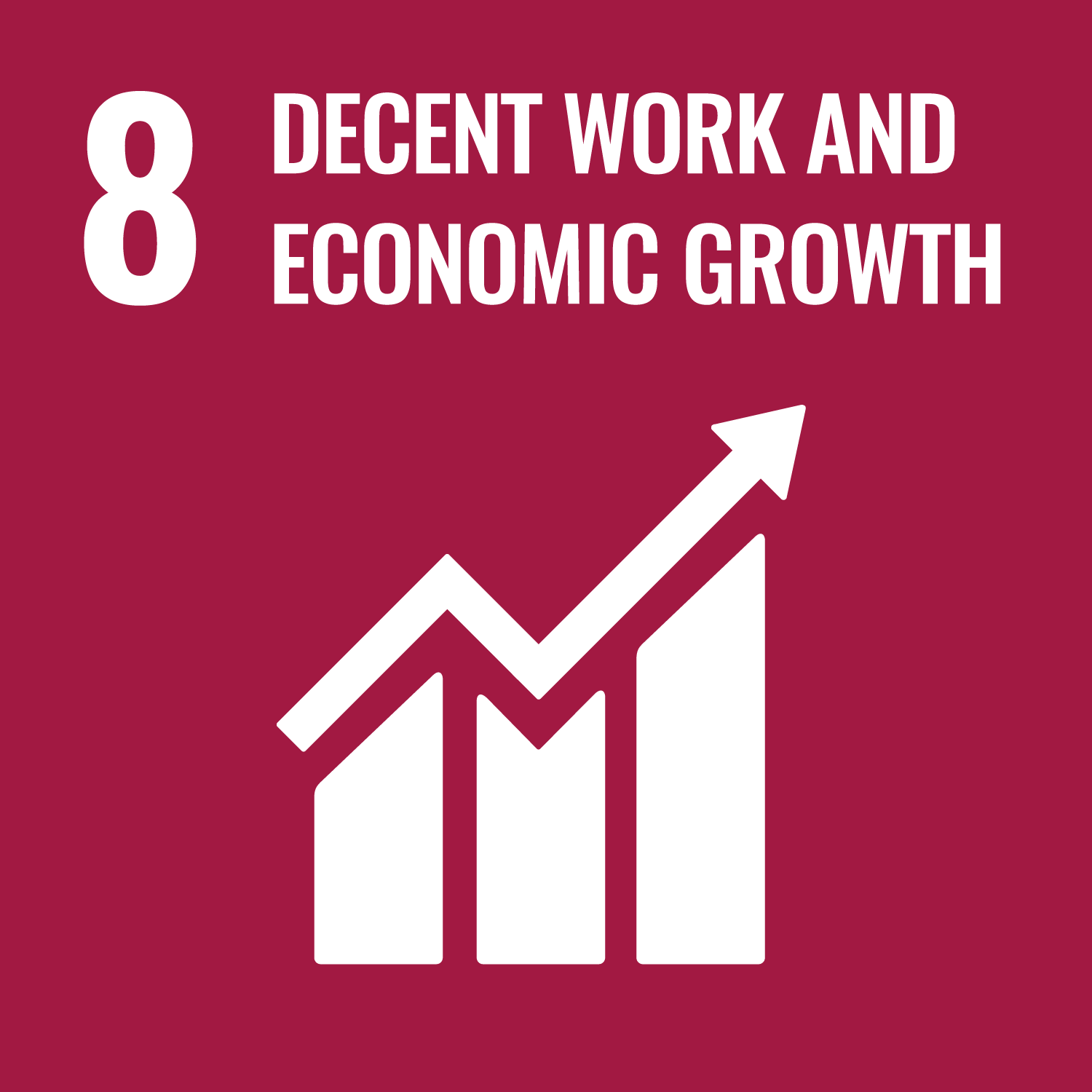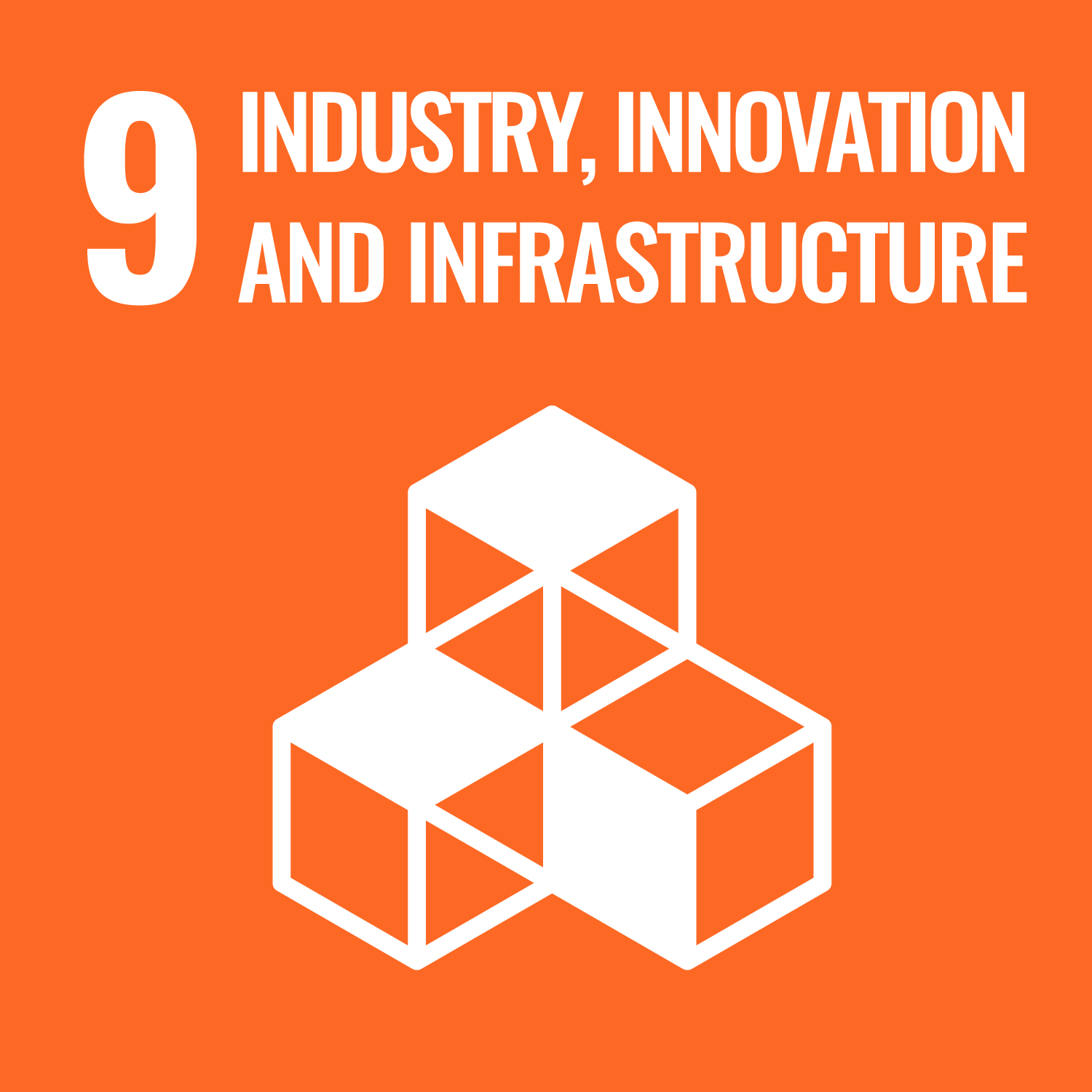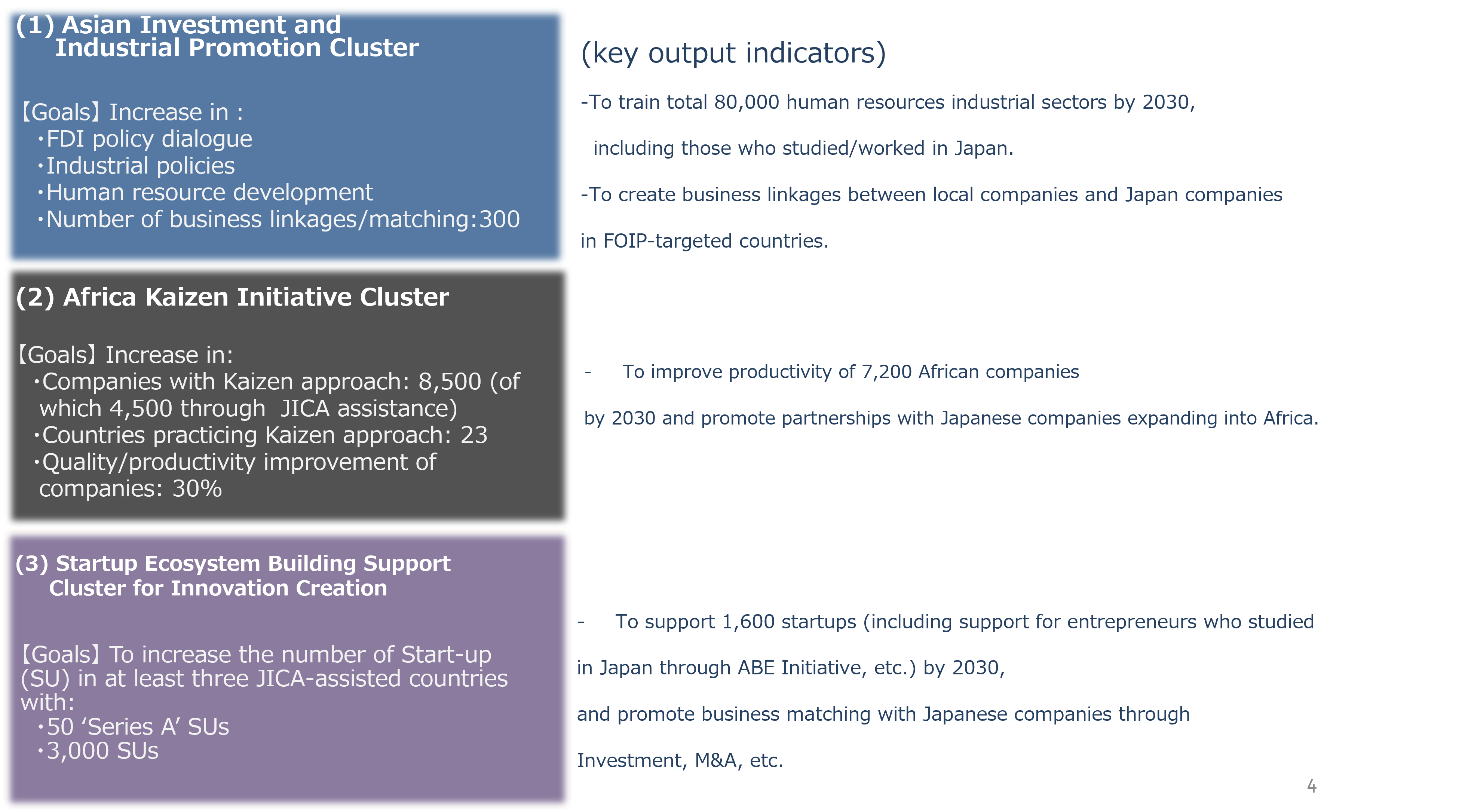In 2021, JICA has released the "JICA Global Agenda," comprising 20 issue- based development strategies. They intend to contribute to the achievement of the SDGs, and the realization of JICA’s mission:"human security" and "quality growth." One of such strategies is "Private Sector Development", which aims at job creation, developing private sector as the driver of income increase, strengthening competitiveness, innovation, investment promotion and industrial development, among others, for people in developing countries.
Recently, Private Sector Development Group of JICA's Economic Development Department has drawn up three “cluster business strategies” to promote private sector development through cooperation with various partners. Those strategies are: (1) "Asian Investment and Industrial Promotion," (2) "Africa Kaizen Initiative," and (3) "Support for Building a Start-up Ecosystem for Innovation Creation. Promoting ‘quality growth’ by nurturing robust private sectors in developing countries is one of key agenda under Japanese government's foreign policies, such as ‘Free and Open Indo-Pacific (FOIP)’ or ‘the Tokyo International Conference on African Development (TICAD)’. Private sector development is also crucial for Japan’s future vitality, e.g. through ‘co-creation’ with various partners such as local entrepreneurs who once studied or worked in Japan. Under these new strategies, JICA will implement projects with specific goals and targets illustrated as in the table below.
For (1) "Asian Investment and Industrial Promotion," we devised a scenario for future industrial promotion in Asia, drawing lessons learned from previous cases such as the industrial zone development of the waterfront in the eastern Thailand. (2) “Africa Kaizen Initiative” aims to spread “kaizen” throughout Africa. Kaizen originates from Japanese manufacturers’ approach to improve quality and productivity, now widely recognized, and adopted throughout the world. (3)"Support for Startup Ecosystem Development" derives largely from recent research and experts’ opinions on ever-evolving Start-up industries. Each strategy turns out to be interesting to read, which I highly recommend.
Followings are what I pondered during internal discussions of the strategies, which involved senior management and relevant departments in JICA.
1. Focus on "job creation”
On April 5, 2023, Mr. Ajay Banga, a then candidate of the next president of World Bank attended an event at the Center for Global Development during the World Bank-IMF Spring Meeting. As the candidate, he stressed his commitment to further the Bank's mission to end extreme poverty and to promote shared prosperity. But I particularly found it encouraging that he pointed out that his number one priority was to "provide dignified employment for all, especially youth and women” amidst the complex crises brought about by war, climate change, and other factors. The importance of job-creation and the role of the private sector was also discussed at JICA’s board meeting on the April 18 when these draft strategies were presented. It is particularly urgent in Africa as it needs to address its rapid population growth. The private sector is the key driver to provide "decent work" under SDG Goal 8.
By the way, according to an article in The Economist dated April 5, 2023, the fertility rate in Africa is expected to decline at a relatively rapid rate. Although Africa's current 1.4 billion population is sure to expand further, it is necessary to keep a close eye on the demographic trends in the future as they affects economic and employment environment.
2. Will the manufacturing sector be the driver job creation, especially in Africa ?
The Sadako Ogata Peace and Development Institute of JICA has been working jointly with Professor Joseph E. Stiglitz of Columbia University on various development-related research topics, and they have begun its fifth phase research collaboration with the topics on employment and industrial development. In the kick-off interview, Professor Stiglitz argued that the manufacturing sector, which once led the development of East Asia, has lost its momentum to absorb employment due to changes in industrial structure and technologies. In African context, he pointed out labor-intensive industries such as agriculture, or non-manufacturing service sector like tourism could better absorb the rapid labor increase. Aid agencies like JICA, in this end, may want to target its resources more on agricultural extension and related human resource development,
The Economist article on March 29, 2023 also pointed out that India and Indonesia, two main future growth engines of the world economy, are diverging from decades-long development formula in which low-wage workers from agricultural sector move to more productive manufacturing jobs. Both countries seemingly pursue another growth models led by service sectors, such as IT. The article, however, also argues that none of these new models have yet to prove they can create sufficient employment.
The rapid industrialization of eastern Thailand coincided with the FDI rush by Japanese manufacturing industries due to rapid appreciation of yen after the Plaza Accord, that led to the development of Thailand's automobile industry. It is unclear whether Africa would benefit from similar FDI boom in the manufacturing sector in the future. Yet, I wonder if agriculture and service sector cannot create enough jobs in Africa.
African Continental Free Trade Area (AfCFTA) was launched in 2021, and it is expected to expand intra-African trade through the gradual elimination of the tariffs and simplification of customs clearance procedures. According to IMF, Africa's trade in products is currently dominated by primary processed goods, and the manufacturing sector remains weak. If AfCFTA could promote the regional economic integration which is endowed with huge population, it estimates the intra-regional trade is expected to increase by up to 110%, thereby promoting intra-regional industrial value-chains. JICA and AfCFTA Secretariat signed a business cooperation agreement when AfCFTA Secretary General Wamkele Mene visited Japan in December 2022. The purpose of this agreement is to cooperate in areas such as improving the trade environment and fostering industries that support free trade. It is significant that JICA continues to support AfCFTA in the context of industrial promotion and job creation in Africa.
3. Change in international macroeconomic environment and impact on future private sector development in developing countries
I am also concerned how current changes in the international macroeconomic environment, such as interest rate hike and change in liquidity, would negatively impact private sector development in developing countries, and how JICA should respond to such challenges. In last March this year, then World Bank President David Malpass announced "Strengthening of World Bank Delivery on Private Capital Facilitation," a new policy for private sector development that includes: 1) Creating an environment to promote capital flows to the private sector (macroeconomic stabilization, business environmental improvement), JICA also needs to review its support menu in response to these changes.









scroll